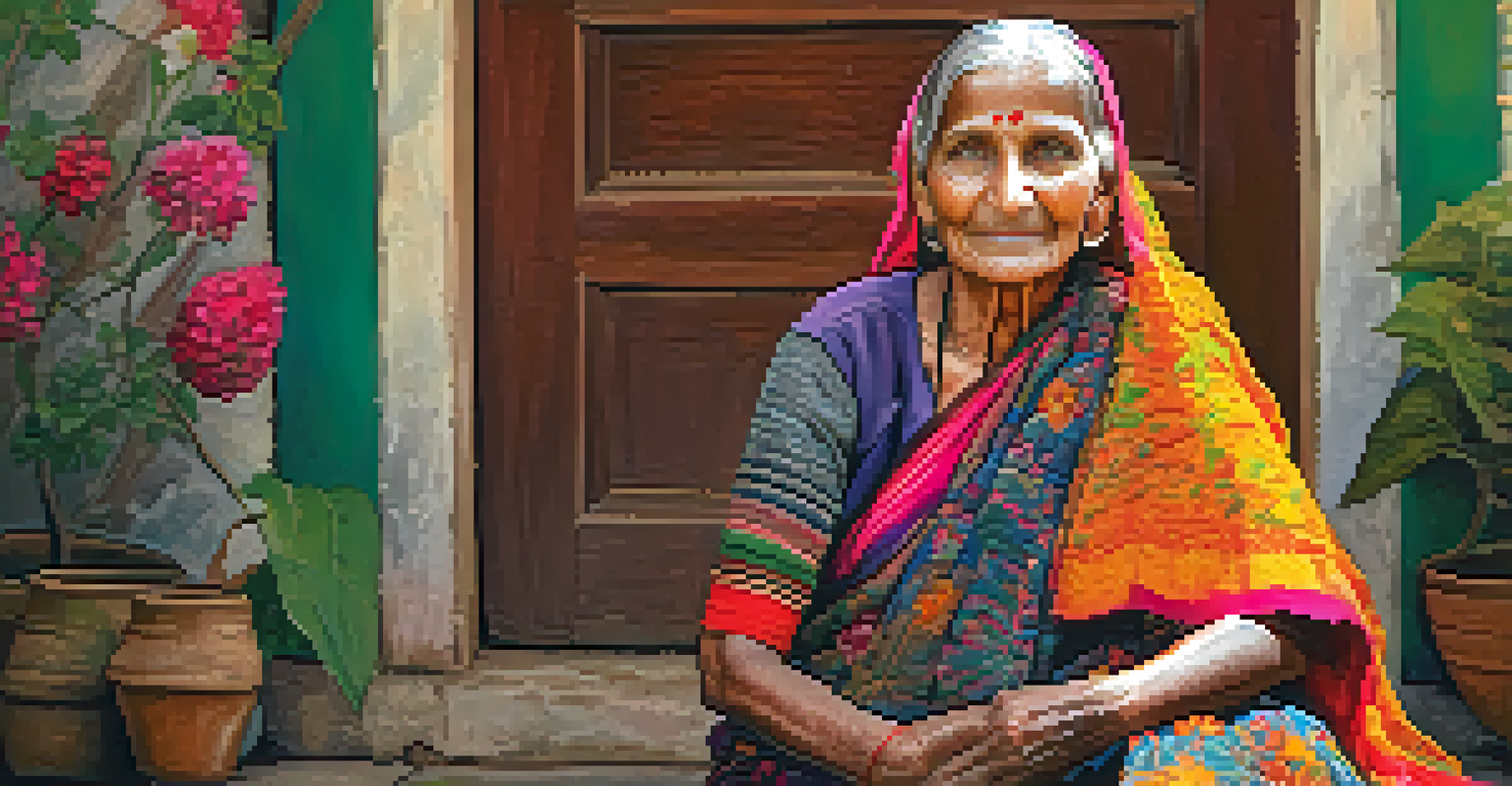Understanding Travel Photography Ethics: A Comprehensive Guide

Defining Travel Photography Ethics and Its Importance
Travel photography ethics encompass the moral principles that guide photographers in their work. These ethics are crucial because they help maintain integrity, respect, and sensitivity towards the subjects and cultures being photographed. By adhering to ethical guidelines, photographers can foster trust and positive relationships with the communities they document.
The camera is an instrument that teaches people how to see without a camera.
Understanding these ethics is not just about avoiding harm; it's also about enhancing the storytelling aspect of travel photography. When photographers respect local customs and traditions, they create more authentic and compelling narratives. This authenticity can resonate deeply with viewers, leading to a more impactful visual experience.
Ultimately, travel photography ethics serve as a foundation for responsible photography. They encourage a mindset of mindfulness, urging photographers to consider the implications of their work on individuals and communities. This awareness can transform a simple photograph into a meaningful representation of a culture or story.
Respecting Cultural Sensitivities in Photography
Cultural sensitivity is a cornerstone of ethical travel photography. It involves understanding and respecting the customs, beliefs, and traditions of the communities you are photographing. This means being aware of the potential impact your presence and your camera can have on a culture, and adjusting your approach accordingly.

For instance, in some cultures, photographing certain rituals or ceremonies may be considered disrespectful or intrusive. Before snapping photos, it's often wise to ask for permission and gauge the comfort level of those being photographed. This simple act of respect can lead to more genuine interactions and beautifully candid images.
Importance of Travel Photography Ethics
Ethical guidelines in travel photography promote integrity and respect for the cultures and individuals being photographed.
By prioritizing cultural sensitivity, photographers not only uphold ethical standards but also enrich their own experiences. Engaging with locals and learning about their traditions can lead to deeper connections and more profound stories. The key is to approach each situation with humility and a willingness to learn.
The Role of Consent in Travel Photography
Consent is a vital element in the ethics of travel photography. It refers to obtaining permission before photographing individuals, particularly in sensitive contexts. This practice ensures that the rights and dignity of subjects are respected and recognized, fostering a sense of trust between the photographer and the community.
Photography is the story I fail to put into words.
Obtaining consent can take various forms, from a simple verbal agreement to a more formal written release. It's essential to be transparent about how the images will be used, as this helps subjects feel more comfortable and valued. In some cases, offering to share copies of the photographs can be a generous gesture that reinforces goodwill.
In situations where obtaining explicit consent is challenging, such as in crowded public spaces, photographers should still strive to be respectful. Observing and understanding the dynamics of the environment can guide ethical decision-making, ensuring that the photographer's presence does not exploit or harm anyone.
Identifying Exploitation in Travel Photography
Exploitation in travel photography occurs when photographers take advantage of vulnerable subjects for personal gain. This can manifest in various ways, such as photographing impoverished communities without acknowledging their struggles or failing to provide proper context. Recognizing and addressing exploitation is crucial for maintaining ethical integrity.
To avoid exploitation, photographers should strive to tell authentic stories that highlight the resilience and richness of cultures rather than reduce subjects to mere caricatures. Engaging with local communities and understanding their narratives can help create more respectful and empowering images. It's about showcasing the beauty and complexity of a culture, not just its hardships.
Cultural Sensitivity and Consent
Respecting cultural sensitivities and obtaining consent are crucial for building trust and fostering genuine interactions with subjects.
Additionally, ethical photographers often seek to give back to the communities they photograph. This could involve supporting local businesses or donating a portion of their earnings from photography projects. Such efforts can help mitigate the impact of exploitation and promote a more equitable relationship between photographers and their subjects.
Understanding the Impact of Your Images
Every photograph has the power to influence perceptions and narratives about a place or culture. Ethical travel photographers should be mindful of the impact their images can have, as they contribute to broader societal understandings. This awareness can guide photographers in creating content that is respectful and representative.
For example, images that perpetuate stereotypes or misrepresent a culture can lead to harmful misconceptions. Photographers have a responsibility to present subjects in a genuine light, ensuring that their work contributes to a positive dialogue about the places they visit. This commitment to authenticity can foster greater appreciation and understanding among viewers.
Moreover, considering the long-term implications of images is essential. A single photograph can circulate widely on social media and shape public opinion. Therefore, ethical photographers must approach their work with a sense of responsibility that acknowledges the weight of their visual storytelling.
Navigating the Fine Line Between Art and Ethics
The intersection of art and ethics in travel photography can often be a delicate balance. On one hand, photographers are artists aiming to capture beauty and expression; on the other, they must navigate ethical considerations that relate to their subjects. Finding harmony between these two aspects is essential for responsible storytelling.
When creating art, it's easy to get caught up in aesthetic choices that may overlook the ethical implications of a shot. However, ethical photographers prioritize the dignity of their subjects, ensuring that their artistic vision does not come at the expense of respect and integrity. This balance enriches both the artistic and ethical dimensions of travel photography.
Impact of Images on Perception
Photographers must be mindful of the influence their images have on societal narratives and strive for authenticity in their storytelling.
Ultimately, navigating this fine line requires continuous reflection and dialogue. Engaging with fellow photographers and communities can provide valuable perspectives on how to blend creativity and ethics seamlessly. This commitment to introspection can elevate one's work, leading to photography that resonates both visually and ethically.
The Future of Ethical Travel Photography
As our world becomes increasingly connected, the conversation around ethical travel photography is more relevant than ever. With the rise of social media, photographers have a platform to share their work widely, but this also brings added responsibility. The future of travel photography will likely emphasize ethical practices more strongly as awareness grows.
Emerging photographers are more conscious of the ethical implications of their work, often prioritizing responsible storytelling. This shift towards ethical practices is encouraging, showing that the next generation of photographers values authenticity and respect. As these principles become mainstream, the quality of travel photography can improve significantly.

Ultimately, the future of ethical travel photography is about fostering a culture of respect and empathy. By embracing ethical practices, photographers can contribute to a richer, more diverse visual landscape that honors the complexities of our world. This commitment to ethics not only benefits individual photographers but also elevates the art form as a whole.
Conclusion: Embracing Ethical Practices in Travel Photography
In conclusion, understanding travel photography ethics is essential for creating responsible and impactful images. By prioritizing cultural sensitivity, consent, and authenticity, photographers can elevate their work and contribute to a more respectful narrative. Ethical practices not only enhance the storytelling aspect but also foster meaningful connections with subjects and communities.
As photographers embark on their journeys, they must remain mindful of their role and the responsibilities that come with their craft. Embracing ethical practices is a journey, one that leads to greater understanding and appreciation of the diverse cultures we encounter. Each decision made behind the lens can shape perceptions and narratives.
Importance of Photography Ethics
Ethical guidelines in travel photography foster trust and respect between photographers and the communities they document.
Ultimately, ethical travel photography is about more than just capturing stunning images; it's about honoring the stories and lives behind those images. By committing to ethical practices, photographers can ensure that their work resonates with authenticity and respect, paving the way for a more compassionate and connected world.